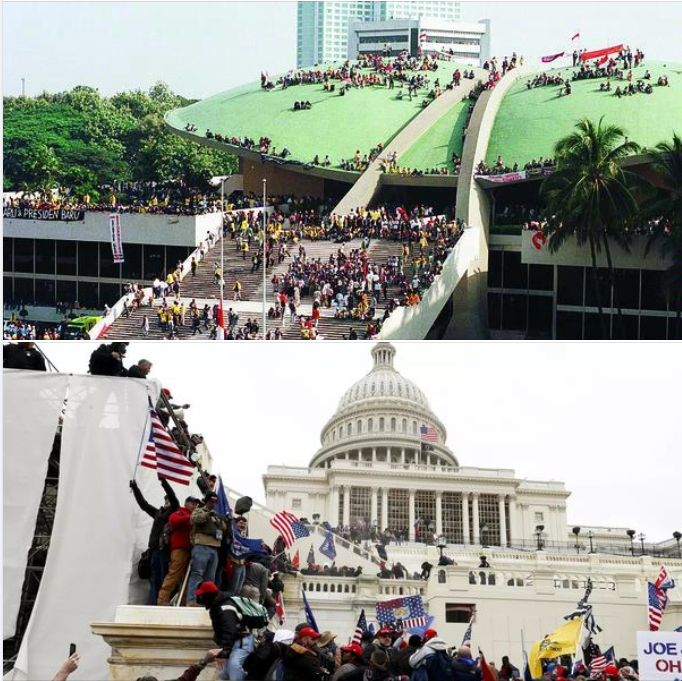The United States and Indonesia both find themselves in an unenviable spot at the moment: confronting existential threats to liberal democracy. In the Indonesian case, the hardline Islamist group Front Pembela Islam (Islamic Defenders’ Front) has recently been banned as an organization by the Jokowi administration. FPI has been responsible violence against Indonesia’s non-Muslims, against liberal and progressive groups, and others. In the US case, a riotous mob of Trump supporters invaded and occupied the Capitol yesterday, causing death, widespread destruction of property, halting the work of the Congress, and shocking the world.
These are obviously not the same problem: one is a bunch of hardline Islamists who reject the rights and liberties provided to all Indonesians under the country’s 1945 constitution, the other a bunch of MAGA/Proud Boys who honestly oppose the peaceful transfer of power via constitutional means. And yet they both force us to to grapple with a singular question: what is the proper way to respond to groups that not only violate the law, but do so in opposition to liberal democracy and the established constitutional order?
I have argued that Jokowi’s banning of FPI is mistake (here is an article in Indonesian that covers a Twitter thread). Not only will banning FPI as an organization not address the ideological support that FPI draws upon, not only will it create a narrative that the organization is being unfairly singled out, not only will it fail to address the structural preconditions that explain the emergence of groups like FPI, but it is also fundamentally illiberal. The approach that the Jokowi administration should follow—which is unlikely, for reasons that need not detain us here—is to use Indonesia’s criminal justice system to try FPI members for acts of violence and incitement, and to punish those convicted aggressively, publicly, and transparently. Although I’m unclear on the specifics on Indonesian law on organized crime, FPI as an organization could be handled as a kind of criminal syndicate.
It does not make me a “FPI defender” or “FPI denier” to make a case for using the criminal justice system to confront FPI rather than to treat it as a threat to the Constitution and national security and ban it for that reason. Indeed, it is precisely because I find the group so abhorrent that I urge Indonesians to find an effective, permanent, and public solution to the threat that FPI poses to all Indonesians as individuals, and to Indonesian democracy as a whole.
The same thoughts cross my mind as I consider how best to respond to the riotous Americans who attempted to stop the final Congressional certification of the 2020 presidential election. I do think that these events plainly call into question the American constitutional order and the peaceful transfer of power.* I want to know why those who stormed the halls of government and threatened the lives of the Vice President and Members of Congress (to say nothing of the staffers and workers there) were not met with live fire on the Capitol steps.** Everyone who downplayed the threat of Trump and Trumpism for American democracy needs to take a sober look at American politics this morning, and listen to all of us who did.
And yet I am uninterested in classifying yesterday’s events as a coup, rather than a riot, a coordinated mass action, or something else. Although my thoughts are not yet settled, I support an approach that views these acts as criminal rather than treasonous (even if I believe that they probably are treasonous). Describing the rioters as treasonous coup-makers feels satisfying in my gut, as capturing what I feel about what I saw, but it has the effect of recognizing their demands even as it rejects them.
Americans should not look at the pathetic assembly of rioters as a mass of wannabe John Browns and Patrick Henrys, and Americans should reject any framing of the events that suggests as much. There should be no outs, even suggesting that their actions had legitimate political standing according to some perspective. The response should be to identify each and every participant, charge them with the crimes for which they are responsible, and try them in a court. And the current president ought to be removed from office via constitutional means for encouraging their behavior.
Postscript
An Indonesian friend shared this on Facebook last night: a comparison of the 1998 students’ occupation of the People’s Consultative Assembly (top), and the 2021 Capitol riot (bottom).

Note
* I don’t think the outcome of a Biden presidency was ever in doubt, even in the very worst moments when guns were drawn.
** I am not exaggerating.